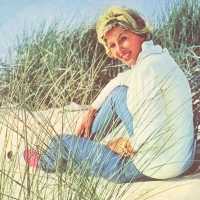Lale Anderson (born March 23, 1905 in Bremershaven, Germany – died August 29, 1972 in Vienna, Austria) was a German singer and songwriter, who is best known for being the first ever artist to record the song “Lili Marleen” on August 1, 1939 (originally titled “Lied Eines Jungen Wachtpostens”). Anderson initially only sold 700 copies of her recording. The song became tremendously popular on both sides of the front during World War II, when it was frequently played by Radio Belgrad in the then-occupied Yugoslavia. Albeit Anderson was initially prohibited to perform by the Nazis, the song “Lili Marleen” in particular, she was later ordered by Joseph Goebbels to record Nazi propaganda songs, in both German and English.
Anderson maintained to have a successful career in music, until the late 1960s. She entered the Eurovision Song Contest for Germany in 1961, with “Einmal Sehen Wir Uns Wieder”, only reaching #13 with just three points and thus becoming one of Germany’s lowest scoring entries. The 1967 farewell tour was followed by two best-selling books, including her chart-topping biography in 1972. Shortly after its release, Anderson died from a heart attack.
Full biography Lale Andersen (23 March 1905 – 29 August 1972) was a German chanson singer-songwritera born in Bremerhaven, Germany. She is best known for her interpretation of the song Lili Marleen in 1939, which became world-famous on all sides during the second World War.
She was born in Leheb and baptized Liese-Lotte Helene Berta Bunnenberg. In 1922, at the age of 17c, she married Paul Ernst Wilke (1894 – 1971), a local painter.d They had three children together: Björn, Carmen-Litta, and Michael. Shortly after the birth of the third child, the family broke up: leaving the children in the care of her relatives, Lale went in October 1929[2] to Berlin, where she reportedly studied acting at the Schauspielschule at the Deutsches Theater.
In 1931, her marriage was ended in divorce. Around the same year, she began appearing on stage in various cabarets in Berlin, with mixed success. From 1933 to 1937, she performed at the Schauspielhaus in Zürich, where she also met Rolf Liebermann, who would be a close friend for the rest of her life. In 1938, she was in Munich at the cabaret Simpl, and soon afterwards joined the prestigious cabaret Kabarett der Komiker in Berlin.
At the Kabarett der Komiker, she met Norbert Schultze, who had just written the music for Lili Marleen. Lale recorded the song in 1939, but it would become a success only when the Soldatensender Belgrad (Belgrade Soldier’s Radio), the radio station of the German armed forces in occupied Yugoslavia started sending it in 1941. It became rapidly and immensely popular with German soldiers at the front. The transmitter of the radio station at Belgrade was powerful enough to be received all over Europe,[4] and thus the song soon also became popular with the Allied troops.
However, the German officials did not like the sad song about a love parted at all, and Joseph Goebbels prohibited its being played on the radio. Lale Andersen was not allowed to perform publicly for nine months, not only because of the song but also because of her relations with Rolf Liebermann, who was Jewish, as well as with several other Jewish artists she had met in Zürich. In desperation, Lale unsuccessfully attempted to commit suicide. When she was allowed to perform again, it was only subject to several conditions, one of which was not to sing Lili Marleen. In the remaining war years, Lale Andersen had one minor appearance in a propaganda movie and was employed to sing several propaganda songs in English. Shortly before the end of the war, Lale retreated to Langeoog, a small island off the North Sea coast of Germany.
After the war, Lale Andersen had all but disappeared as a singer. In 1949, she married Swiss composer Artur Beul. In 1952 she had a comeback with the song Die blaue Nacht am Hafen, to which she had written the text herself.
In 1959 she landed another big hit Ein Schiff wird kommen…, a cover version of the title song from the movie Never on Sunday, originally sung by Melina Mercouri. Both songs won her a gold album each in Germany.
In 1961, she participated as the representative of Germany in the Eurovision Song Contest with the song Einmal sehen wir uns wieder, which reached 13th place with three points. Throughout the 1960s, she toured extensively through Europe and also performed in the U.S. and Canada until her farewell tour Goodbye memories in 1967. Two years later, she published a book entitled Wie werde ich Haifisch? – Ein heiterer Ratgeber für alle, die Schlager singen, texten oder komponieren wollen (How do I become a shark? A cheerful companion for all, that sings songs, writes lyrics and composes music), and in 1972, shortly before her death, her autobiography Der Himmel hat viele Farben (The Sky has many Colours) appeared and topped the bestselling list of the German magazine Der Spiegel.
Lale Andersen died in Vienna, Austria, and is buried at the dune cemetery of the East Frisian island Langeoog.
